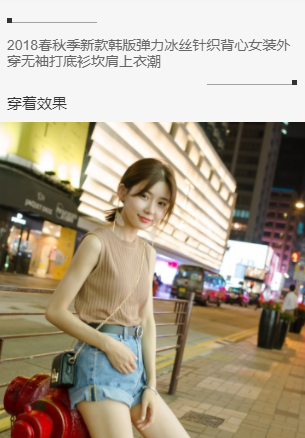
详情页店铺后面的图片详情展示、穿着效果这些的展示的部分思路与代码的记录。
首先,我们需要实现的是将接口中我们所需展示到此的数据保存在data中,那么即可在detail.vue中先进行如下操作。
data() { return { detailInfo:{} } }, created() { // console.log(this.$route.params.iid) this.iid = this.$route.params.iid getdetails(this.iid).then(res => { console.log(res); const big = res.data.result; this.detailInfo = big.detailInfo } }) }
之后我们封装一个相应组件并将需要的数据传入该组件中,并在detail.vue中注册该组件。
detailgoods里面:
props: {
detailInfo: {
type: Object
}
}
之后在detail.vue中去注册且引入该组件,并绑定相应数据:
<detailgoods :detail-info="detailInfo""></detailgoods>
import detailgoods from "./childcomponent/detailgoods";
components: {Detailnav, detailswiper,detailbaseinfo,detailshopinfo,scroll,detailgoods}
后期,我们即可在detailgoods组件中按照相应的需求效果实现啦~
<template> <div v-if="Object.keys(detailInfo).length !== 0" class="goods-info"> <div class="info-desc clear-fix"> <div class="start"> </div> <div class="desc">{{detailInfo.desc}}</div> <div class="end"></div> </div> <div class="info-key">{{detailInfo.detailImage[0].key}}</div> <div class="info-list"> <img v-for="(item, index) in detailInfo.detailImage[0].list" :src="item" alt="" @load="imgLoad" :key="index"> </div> </div> </template> <script> export default { name: "DetailGoodsInfo", props: { detailInfo: { type: Object } }, data(){ return{ counter:0, imagesLength:0 } }, methods:{ imgLoad(){ this.$emit("imageload") } } // methods:{ // imgLoad(){ // if (++this.counter === this.imagesLength) { // // this.$emit('imageload') // } // } // }, // watch:{ // detailInfo(){ // this.imagesLength = this.detailInfo.detailImage[0].list.length // } // } } </script> <style scoped> .goods-info { padding: 20px 0; border-bottom: 5px solid #f2f5f8; } .info-desc { padding: 0 15px; } .info-desc .start, .info-desc .end { 90px; height: 1px; background-color: #a3a3a5; position: relative; } .info-desc .start { float: left; } .info-desc .end { float: right; } .info-desc .start::before, .info-desc .end::after { content: ''; position: absolute; 5px; height: 5px; background-color: #333; bottom: 0; } .info-desc .end::after { right: 0; } .info-desc .desc { padding: 15px 0; font-size: 14px; } .info-key { margin: 10px 0 10px 15px; color: #333; font-size: 15px; } .info-list img { 100%; } </style>
这里主要注意一个点:由于使用bscroll插件,由于最开始图片还未加载完全,那么原本bscroll中那个长度值是未包含所有图片都加载进去的值的。因此,有时候上拉加载会有卡顿,为了解决这个问题,之前我们也说过,需要使用refresh函数来对其进行处理,那么为了不多次调用refresh,可以用两种方法进行处理。
第一种的话,比如使用debounce函数:
首先,先在图片上进行一个监听,监听其中图片完全加载完毕。之后在methods里面,进行一个发送,将其发送给父组件detail.vue。那么下方就是对detail.vue中进行一定的处理。(debounce在首页中也用使用到,因此被我封装起来了,直接调入在此处使用)
mounted(){ this.refresh = debounce(this.$refs.scroll.refresh, 1000) }, methods:{ imageLoad(){ this.refresh() // console.log("refresh no debounce") } }
或者,第二种方法,即为在detailgoods里面,直接在data当中初始化一个图片个数以及图片数量,当这两者相等时,才会去发射出相应的事件给父组件。因此在上述的注释代码中,有一个这两者之间的判断,并设置了一个watch函数,watch是监听属性值的变化,只要属性值发生变化就会调用watch对应的函数。之后再在父组件中直接写一个imageLoad事件,使用this.$refs.scroll.refresh即可。